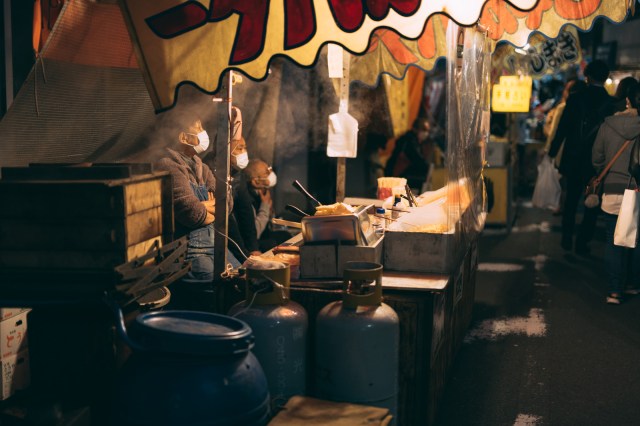
Nothing to shed tears over, really.
From shuttering factory doors to endangering cultural traditions, the effects of the COVID-19 pandemic have been widespread throughout Japan, and naturally criminal yakuza groups have also been impacted operations-wise.
While the infamous crime syndicates are most well-known for making money through illegal means, such as gambling and the black market, one of their legal revenue sources that has been greatly impacted by COVID-19 is their food stalls.
▼ Can I buy these delicious takoyaki in good conscience still?
For some context, food stalls in Japan operate differently compared to other regions of Asia. For example, in countries such as Taiwan, India, and Malaysia, food stalls are mainstays of certain streets and market areas that people regularly eat from.
In Japan on the other hand, food stalls are typically temporary vendors, popping up near shrines and temples during special seasonal events such as hatsumode (the first shrine visit of the New Years) and summer festivals. While many of them are simply run by local businesses, some of them are overseen by yakuza groups.
▼ However, due to the pandemic, many of these seasonal events have been canceled,
providing fewer opportunities for folks to set up their stalls.
An interview with a local yakuza leader on Daily Shincho reveals more in-depth details:
“We usually make the most money selling to folks visiting shrines at the year’s end and New Years. But this year cause of COVID-19, it’s become completely impossible. Compared to previous years, our profits are only one-third of what we usually make. The number of operating food stalls has shrunk because of government anti-COVID-19 measures, and in addition to that, the crowds visiting shrines have gone thinner.”
Furthermore, he elaborated on the circumstances if a group decided to set up food stalls regardless of the pandemic:
“Even Tokyo’s Meiji Shrine, which receives the most visitors on New Years in Japan, has shortened our operating hours. No one’s around even at eight or nine at night, which are usually the peak hours. In the past business has always been good but….”
With an overall decrease in sales and Ueno Park canceling its annual Cherry Blossom Festival for 2021, one of the largest hanami events in Japan, this year’s financial prospects are looking bleak, although quite frankly maybe that’s for the better considering the violence these crime groups perpetrate.
▼ Ueno Park also canceled its Cherry Blossom Festival last year,
closing entrances and leaving walkways eerily empty.
Outside of food stalls, COVID-19 has also affected how local yakuza groups operate in general. Considering most of their members are older and more at risk, some groups have suspended their annual end-of-the-year and New Year gatherings, cancelled drinking parties, and avoided working in-person as well.
Only time will tell how yakuza groups will operate in a post-COVID-19 world, though no doubt whatever they do will probably be really fishy.
Source: Daily Shincho via Yahoo! News via Hachima Kiko
Top image: Pakutaso
Insert images: Wikipedia/Fg2, Pakutaso (1, 2)
● Want to hear about SoraNews24’s latest articles as soon as they’re published? Follow us on Facebook and Twitter!
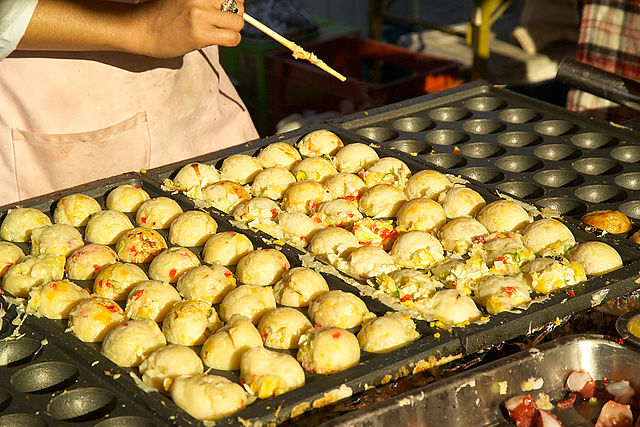
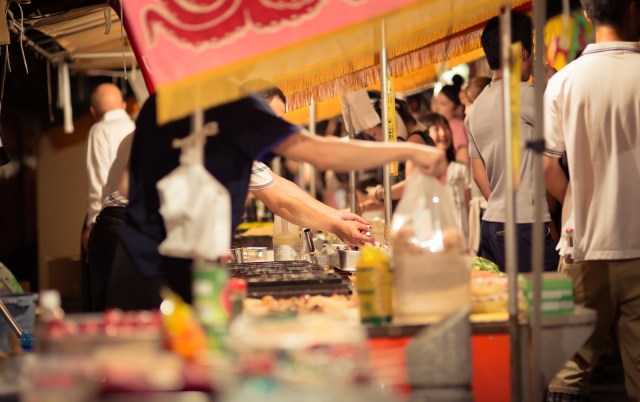
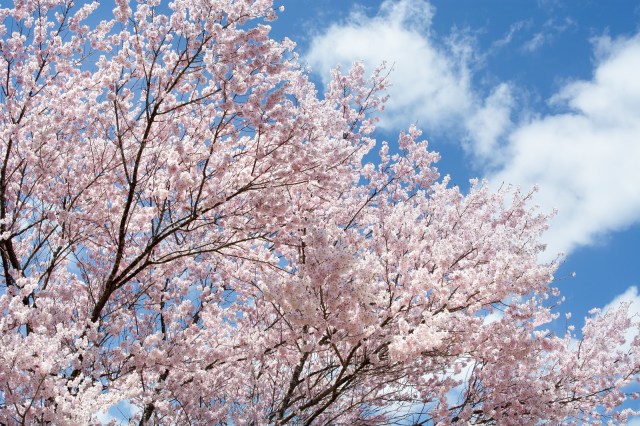
 Hanazono Jinja Shrine: Lanterns, stalls and rakes at annual Tori no Ichi cock festival in Tokyo
Hanazono Jinja Shrine: Lanterns, stalls and rakes at annual Tori no Ichi cock festival in Tokyo Japan’s biggest yakuza organization tweets to announce that Halloween is cancelled this year
Japan’s biggest yakuza organization tweets to announce that Halloween is cancelled this year Host your very own Japanese summer festival with these DIY carnival game stands
Host your very own Japanese summer festival with these DIY carnival game stands Japanese Twitter users agree that yakuza members are more Photoshop savvy than the average joe
Japanese Twitter users agree that yakuza members are more Photoshop savvy than the average joe Japan’s child-eating ogres prepare COVID-19 preventative measures for upcoming New Year’s Eve
Japan’s child-eating ogres prepare COVID-19 preventative measures for upcoming New Year’s Eve How to order snacks on a Shinkansen bullet train in Japan
How to order snacks on a Shinkansen bullet train in Japan Japan’s new difficult-to-drink-from beer glass protects your liver, but it’s a brutal experience
Japan’s new difficult-to-drink-from beer glass protects your liver, but it’s a brutal experience Burger King Japan suddenly adds Dr. Pepper and Dr. Pepper floats to its menu nationwide
Burger King Japan suddenly adds Dr. Pepper and Dr. Pepper floats to its menu nationwide Demon Slayer: Kimetsu no Yaiba gets new roller coaster attractions and food at Universal Studios Japan
Demon Slayer: Kimetsu no Yaiba gets new roller coaster attractions and food at Universal Studios Japan Hello, cosmetics! Clinique teams up with Hello Kitty this summer for first-time collaboration
Hello, cosmetics! Clinique teams up with Hello Kitty this summer for first-time collaboration Kyoto Tower mascot termination reveals dark side behind cute Japanese characters
Kyoto Tower mascot termination reveals dark side behind cute Japanese characters Nintendo history you can feel – Super NES, N64, and GameCube controllers become capsule toys
Nintendo history you can feel – Super NES, N64, and GameCube controllers become capsule toys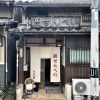 This Nara workshop has been making deer crackers for more than 100 years and offers tours【Photos】
This Nara workshop has been making deer crackers for more than 100 years and offers tours【Photos】 High-fashion Totoro cuddle purse is like an elegant stroll in the forest【Photos】
High-fashion Totoro cuddle purse is like an elegant stroll in the forest【Photos】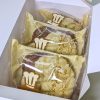 Legendary Melon Bread by Tokyo Banana returns after 20-year absence【Taste Test】
Legendary Melon Bread by Tokyo Banana returns after 20-year absence【Taste Test】 “The most Delicious Cup Noodle in history” – Japan’s French Cup Noodle wins our heart【Taste test】
“The most Delicious Cup Noodle in history” – Japan’s French Cup Noodle wins our heart【Taste test】 Starbucks releases a cute Frappuccino and Unicorn Cake…but not in Japan
Starbucks releases a cute Frappuccino and Unicorn Cake…but not in Japan McDonald’s Japan’s Soft Twist Tower: A phantom ice cream only sold at select branches
McDonald’s Japan’s Soft Twist Tower: A phantom ice cream only sold at select branches Yabai Ramen: What makes this Japanese ramen so dangerous?
Yabai Ramen: What makes this Japanese ramen so dangerous? Finally! Nintendo Japan expands Switch 8-bit controller sales to everybody, Online member or not
Finally! Nintendo Japan expands Switch 8-bit controller sales to everybody, Online member or not Japanese government wants to build luxury resorts in all national parks for foreign tourists
Japanese government wants to build luxury resorts in all national parks for foreign tourists To combat declining birth rate, Japan to begin offering “Breeding Visas” to foreigners
To combat declining birth rate, Japan to begin offering “Breeding Visas” to foreigners 10 things you should buy at 7-Eleven in Japan
10 things you should buy at 7-Eleven in Japan Studio Ghibli releases anime heroine cosplay dresses that are super comfy to wear
Studio Ghibli releases anime heroine cosplay dresses that are super comfy to wear Woman charged for driving suitcase without a license in Osaka
Woman charged for driving suitcase without a license in Osaka Studio Ghibli unveils My Neighbour Totoro miniature house model
Studio Ghibli unveils My Neighbour Totoro miniature house model Kyoto experiencing problems with foreign tourists not paying for bus fares, but not on purpose
Kyoto experiencing problems with foreign tourists not paying for bus fares, but not on purpose Fighting mild hunger with a Japanese soda that turns into jelly in the stomach【Taste test】
Fighting mild hunger with a Japanese soda that turns into jelly in the stomach【Taste test】 Studio Ghibli’s Howl’s Moving Castle tapestry unveiled in Japan for first time
Studio Ghibli’s Howl’s Moving Castle tapestry unveiled in Japan for first time McDonald’s new Happy Meals offer up cute and practical Sanrio lifestyle goods
McDonald’s new Happy Meals offer up cute and practical Sanrio lifestyle goods Sales of Japan’s most convenient train ticket/shopping payment cards suspended indefinitely
Sales of Japan’s most convenient train ticket/shopping payment cards suspended indefinitely Sold-out Studio Ghibli desktop humidifiers are back so Totoro can help you through the dry season
Sold-out Studio Ghibli desktop humidifiers are back so Totoro can help you through the dry season Japanese government to make first change to romanization spelling rules since the 1950s
Japanese government to make first change to romanization spelling rules since the 1950s Foreigner’s request for help in Tokyo makes us sad for the state of society
Foreigner’s request for help in Tokyo makes us sad for the state of society Ghibli founders Toshio Suzuki and Hayao Miyazaki contribute to Japanese whisky Totoro label design
Ghibli founders Toshio Suzuki and Hayao Miyazaki contribute to Japanese whisky Totoro label design Doraemon found buried at sea as scene from 1993 anime becomes real life【Photos】
Doraemon found buried at sea as scene from 1993 anime becomes real life【Photos】 Tokyo’s most famous Starbucks is closed
Tokyo’s most famous Starbucks is closed Princesses, fruits, and blacksmiths: Study reveals the 30 most unusual family names in Japan
Princesses, fruits, and blacksmiths: Study reveals the 30 most unusual family names in Japan Yakuza may be blocked from using all expressways in Japan within the decade
Yakuza may be blocked from using all expressways in Japan within the decade 14 tips for visiting the Mt Fuji Shibazakura Festival, where beautiful “lawn sakura” blossom
14 tips for visiting the Mt Fuji Shibazakura Festival, where beautiful “lawn sakura” blossom Goodbye katanuki? Japanese festival game may go extinct thanks to the pandemic
Goodbye katanuki? Japanese festival game may go extinct thanks to the pandemic Japanese government encouraging hot springs to ease tattoo restrictions
Japanese government encouraging hot springs to ease tattoo restrictions First-ever Bon-Odori dance festival to be held at Shibuya scramble crossing for Obon
First-ever Bon-Odori dance festival to be held at Shibuya scramble crossing for Obon The best cosplayers from the Isshoni Tanoshimimashou otaku event in Indonesia【Photos】
The best cosplayers from the Isshoni Tanoshimimashou otaku event in Indonesia【Photos】 Yakuza bosses struggling to upgrade phones from 3G
Yakuza bosses struggling to upgrade phones from 3G Enjoy the beauty of sakura cherry blossoms at new onsen hanami event in Tokyo
Enjoy the beauty of sakura cherry blossoms at new onsen hanami event in Tokyo Home-hunting in Japan changes as people eye new communities in wake of COVID-19
Home-hunting in Japan changes as people eye new communities in wake of COVID-19 Is ramune another COVID-19 casualty? Iconic Japanese soda faces plummeting sales and bleak summer
Is ramune another COVID-19 casualty? Iconic Japanese soda faces plummeting sales and bleak summer All aboard the “Merry Christmask” train in Mie Prefecture
All aboard the “Merry Christmask” train in Mie Prefecture Trick or Trafficking? Japanese mafia hand out candy to kids on Halloween, get away with it again
Trick or Trafficking? Japanese mafia hand out candy to kids on Halloween, get away with it again The most crowded place in Tokyo? Might be the Kanda Matsuri festival, but it’s still awesome
The most crowded place in Tokyo? Might be the Kanda Matsuri festival, but it’s still awesome Annual Tokyo memorial for March 11 tsunami comes with a heartwarming musical surprise【Video】
Annual Tokyo memorial for March 11 tsunami comes with a heartwarming musical surprise【Video】 Yakuza member arrested for not picking up dog poop
Yakuza member arrested for not picking up dog poop Enjoy hanami cherry blossom viewing on the Ginza Line Sakura Train in Tokyo
Enjoy hanami cherry blossom viewing on the Ginza Line Sakura Train in Tokyo
Leave a Reply